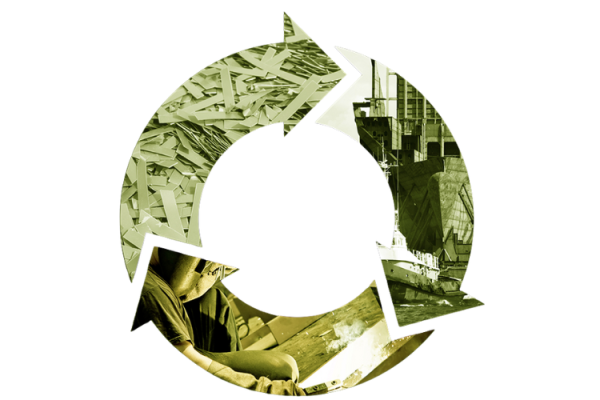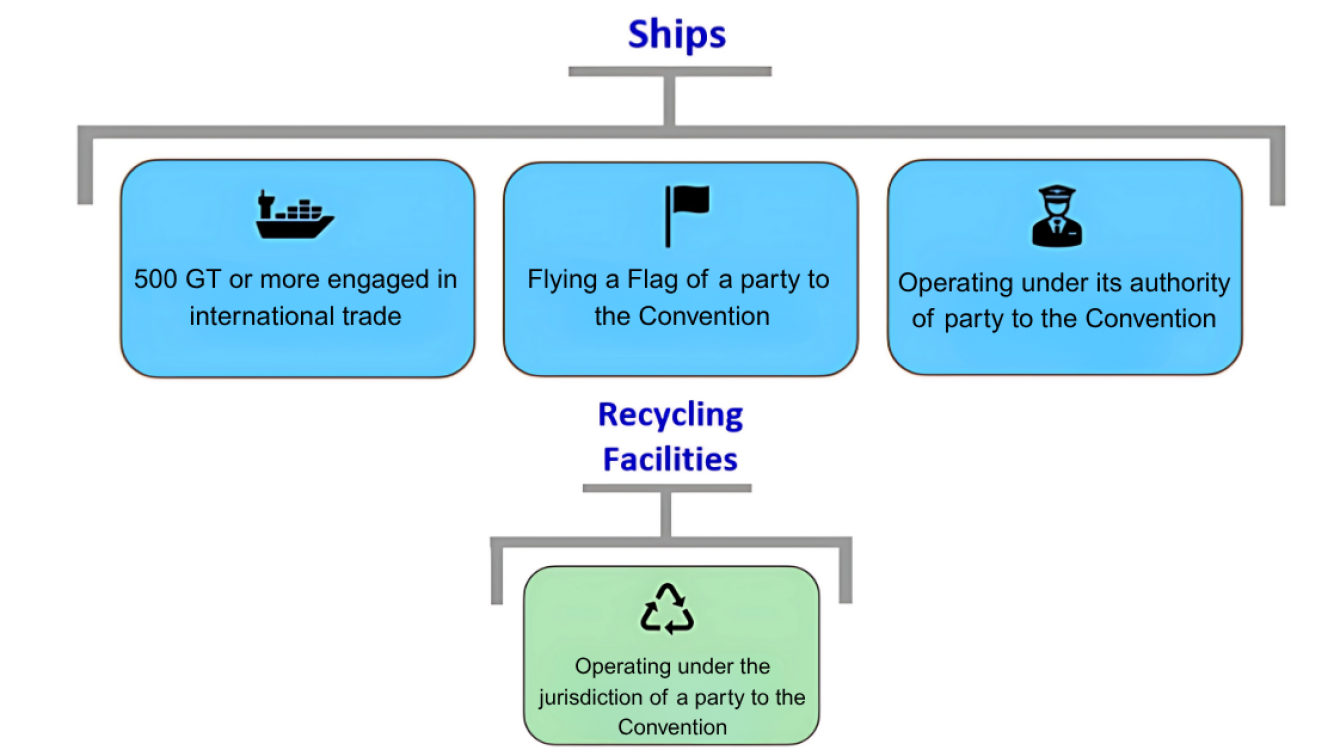Ship Recycling – Understanding the Hong Kong Convention
The Hong Kong Convention mandates safe ship recycling at authorised facilities, requiring certified hazardous material inventories and coordinated compliance with overlapping international regulations.

Risk alerts

Gilmark DMello
Published: 6月 02, 2025
The Hong Kong International Convention for the Safe and Environmentally Sound Recycling of Ships, commonly referred to as the Hong Kong Convention (HKC) enters into force on 26th June 2025.
The Hong Kong Convention (HKC) aims to ensure that ships, at the end of their operational lives, are recycled safely and in an environmentally responsible manner and do not pose any unnecessary risk to human health and safety or to the environment.
The Convention adopts a cradle-to-grave approach for recycling ships, and effective 26th June 2025 a ship flying the flag of a State which is a party to the Convention may only be recycled at authorised ship recycling facilities. The list of ship recycling facilities authorised under the Convention should be available at IMO - Global Integrated Shipping Information System (GISIS).
With the intertwined responsibilities of the shipowner and the recycling company contained within the guidelines to the Convention, Club’s members are encouraged to familiarise themselves with the entire ship recycling process to ensure that they fully understand the expectations and obligations that fall upon all stakeholders involved in complying with the Convention.
1. Application
The Convention is applicable to new and existing ships meeting the criteria described in figure 1.

Figure 1: Applicability for ships and recycling facilities
There is an expectation that non-party flagged ships apply the requirements of the Convention, as such ships would be liable for inspection when calling at ports within the jurisdiction of party states to ensure the principle of “no more favourable treatment” remains satisfied.
Non-party flagged ships must have a Statement of Compliance on Inventory of Hazardous Materials (SoC IHM) from their Flag Administration or RO before sailing to a State which is party to the Convention.
2. Requirements for ships
Ships flying the flag of a State which is party to the Convention are required to maintain control over hazardous materials during the design, construction, operation and maintenance of the ship. The installation or use of hazardous materials is prohibited and/or restricted throughout the operational lifecycle of the ship.
Inventory of Hazardous Materials (IHM)
Ships will be required to carry an Inventory of Hazardous Materials (IHM) guided by MEPC 269(68) identifying the location and approximate quantities of the hazardous materials held on board.
The IHM consists of three parts, with Part I developed and maintained over the life of the ship, while Part II and Part III are developed before the ship is recycled. IHM Part I, II and III will be verified by the Flag administration and/or a Recognised Organisation.
The successful completion of an initial survey to verify IHM Part I would result in the issuance of the International Certificate on Inventory of Hazardous Materials (ICIHM), valid for a period not exceeding 5 years.
Operational Period of the Ship | ||||
IHM | Scope | Applicability | Survey | Certification |
Part I | Hazardous materials within the ship | New ships: Developed and delivered by shipyard at delivery.
Existing ships: Developed by a hazardous material expert
| Initial survey
Renewal survey
Additional survey after a change, replacement, or significant repair.
| International Certificate on Inventory of Hazardous Materials (ICIHM) |
Preparation for recycling of the ship
Shipowners have a responsibility to notify their Flag State of the intention to recycle a ship in order to initiate the survey and certification requirements.
In preparation for recycling a ship, in addition to a properly maintained and updated IHM Part I, IHM Part II and Part III would have to be developed and verified by the Flag State and/or designated Recognised Organisation.
End-of-life of the Ship | ||||
IHM | Scope | Applicability | Survey | Certification |
Part II | Operationally generated wastes | Developed when decision is made to recycle the ship
| Final survey
| International Ready for Recycling Certificate (IRRC) |
Part III | Stores | Developed when decision is made to recycle the ship
| ||
The successful completion of final survey involving the verification of IHM Part I, II and III would result in the issuance of the International Ready for Recycling Certificate (IRRC), valid for a period not exceeding 3 months.
In selecting the ship recycling facility, the members will have to exercise due diligence to ensure that the facility is authorised by its competent authority and that it holds a valid Document of Authorisation for Ship Recycling (DASR).
3. Requirements for Ship Recycling Facilities
Ship recycling facilities should be designed, constructed and operated in a safe and environmentally sound manner in accordance with the regulations of the Convention. The authorisation of ship recycling facilities is undertaken by a Competent Authority designated by the Flag Administration.
Authorisation of Ship Recycling Facility
To obtain authorisation, the ship recycling company should develop and submit to the designated Competent Authority a Ship Recycling Facility Plan (SRFP). The competent authorities would be guided by MEPC.211(63) when issuing a Document of Authorisation for Ship Recycling (DASR).
Preparation of a Ship Recycling Plan (SRP)
Prior to the intended recycling of a ship, the ship recycling facility is required to prepare a ship specific Ship Recycling Plan (SRP) that takes into account the guidelines set out within MEPC.196(62) and obtain approval of the SRP from the designated Competent Authority.
Reporting requirements
The recycling facility has a responsibility to notify the Competent Authority within their jurisdiction as below:
Initial notification of the intent to recycle a ship together with a draft SRP.
Follow up notification of the planned start of recycling after the ship is in receipt of the International Ready for Recycling Certificate (IRRC).
On completion of recycling, compile and report the Statement of Completion.
While the Convention will be the guiding instrument for the maritime industry regulating the recycling of ships, the Basel Convention, regulating the transboundary movement of hazardous waste, deems an end-of-life ship as hazardous waste. As it stands today the interplay between the HKC and Basel Convention is a cause of uncertainty for the maritime stakeholders, prompting the IMO to issue a provisional guidance HKSRC.2/Circ.1 on the implementation of the Hong Kong and Basel Conventions.
It should also be noted that the European Union has its own regulations related to ship recycling and waste. EU flagged ships will also have to take the requirements of Regulation (EU) 1257/2013, on ship recycling (EU SRR) and Regulation (EU) 2024/1157, on the shipment of waste (EU WSR) into account, during the operational, as well as end-of-life periods of the ship.
As regulated ship recycling gains momentum, some countries may introduce their own additional regulations and requirements that must also be considered. It is therefore recommended that members seek advice from the relevant Flag administration, and/or designated Recognised Organisation, for further understanding on the expectations and obligations in relation to the recycling of their ships.
Supportive Information
For further information on this or other Loss Prevention topics please contact the Loss Prevention Department, Steamship Insurance Management Services Ltd.
Tel: +44 20 7247 5490 Email: [email protected]
リソース
HKC Convention - Hong Kong International Convention for the Safe and Environmentally Sound Recycling of Ships, 2009
Resolution MEPC. 269(68) – 2015 Guidelines for the Development of the Inventory of Hazardous Materials (IHM)
Resolution MEPC.196(62) – 2011 Guidelines for the Development of the Ship Recycling Plan
Resolution MEPC.211(63) – 2012 Guidelines for the Authorization of Ship Recycling Facilities
Risk Alert 114

